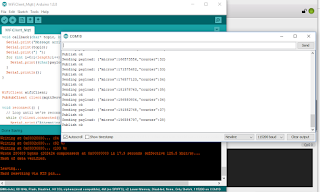https://askubuntu.com/questions/786367/setting-up-arduino-uno-ide-on-ubuntu
I found I couldn't download over serial port Blink example to NodeMCU
kilnageer@kilnageer-Inspiron-3537:~$ dmesg | grep tty
[ 0.000000] console [tty0] enabled
[ 9640.093642] usb 1-1.4: ch341-uart converter now attached to ttyUSB0
[10666.992832] ch341-uart ttyUSB0: ch341-uart converter now disconnected from ttyUSB0
[10668.867323] usb 1-1.4: ch341-uart converter now attached to ttyUSB0
kilnageer@kilnageer-Inspiron-3537:~$ sudo adduser kilnageer dialout
Then logged out as Kilnageer and back in. Download then worked.
Had to include libraries PubSubClient for MQTT and adafruit unified sensor
https://lastminuteengineers.com/esp8266-dht11-dht22-web-server-tutorial/
http://www.steves-internet-guide.com/install-mosquitto-linux/
I followed the install instructions for Ubuntu but they seemed to miss a few important steps. Here are the steps I used.
{"micros":22966832,"counter":4}
{"micros":28040128,"counter":5}
Trouble with DHT22 though DHT11 works. May use code here to investigate:
https://www.keuwl.com/electronics/rduino/bluet/08-dht11/
Rather than Adafruit uni sensor library for DHTXX.
Also .cpp code available from here:
https://www.instructables.com/id/How-to-interface-Humidity-and-Temperature-DTH11-Se/
https://drive.google.com/file/d/0B1paTI5fzcHodno5azFOSVVDT0E/view?usp=sharing
I found I couldn't download over serial port Blink example to NodeMCU
kilnageer@kilnageer-Inspiron-3537:~$ dmesg | grep tty
[ 0.000000] console [tty0] enabled
[ 9640.093642] usb 1-1.4: ch341-uart converter now attached to ttyUSB0
[10666.992832] ch341-uart ttyUSB0: ch341-uart converter now disconnected from ttyUSB0
[10668.867323] usb 1-1.4: ch341-uart converter now attached to ttyUSB0
kilnageer@kilnageer-Inspiron-3537:~$ sudo adduser kilnageer dialout
Then logged out as Kilnageer and back in. Download then worked.
Had to include libraries PubSubClient for MQTT and adafruit unified sensor
https://lastminuteengineers.com/esp8266-dht11-dht22-web-server-tutorial/
http://www.steves-internet-guide.com/install-mosquitto-linux/
Installing The Mosquitto Broker
The download links and install directions for Linux are here.I followed the install instructions for Ubuntu but they seemed to miss a few important steps. Here are the steps I used.
- sudo apt-add-repository ppa:mosquitto-dev/mosquitto-ppa
- sudo apt-get update
- sudo apt-get install mosquitto
- sudo apt-get install mosquitto-clients
{"micros":22966832,"counter":4}
{"micros":28040128,"counter":5}
Trouble with DHT22 though DHT11 works. May use code here to investigate:
https://www.keuwl.com/electronics/rduino/bluet/08-dht11/
Rather than Adafruit uni sensor library for DHTXX.
Also .cpp code available from here:
https://www.instructables.com/id/How-to-interface-Humidity-and-Temperature-DTH11-Se/
https://drive.google.com/file/d/0B1paTI5fzcHodno5azFOSVVDT0E/view?usp=sharing










